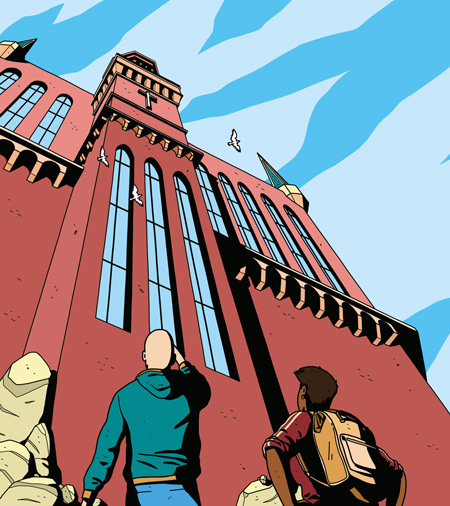
Illustrations by Federico Tramonte
It was early in my tenure, and I had never been in a discussion group with nine other presidents when all 10 of us had laughed uproariously. I said that one of the intriguing experiences in this new leadership role was how frequently I had heard the rationale for not adopting a practice from another school was because our institution was unique. Then, one by one, each administrator shared precisely the identical story. We were all leading an ATS-accredited school so distinctive that it was not like any other theological school. Dark presidential humor was the appropriate response to the brooding presence of exceptionalism.
In their book America Against the World, Andrew Kohut and Bruce Stokes grapple with the international rise of anti-Americanism in the early 2000s by noting three types of exceptionalism.
Misunderstood exceptionalism occurs when other countries or individuals misread U.S. qualities in a prejudicial manner, failing to realize that is not the self-perception of America itself. Conditional exceptionalism describes patriotism and pride in U.S. values, but it lacks evangelistic fervor in that the rest of the world does not need to be proselytized. Problematic exceptionalism raises concerns about the negative global impact of the American ethics of optimistic self-reliance and independence.
Trevor McCrisken, a British scholar with expertise in American exceptionalism, notes that Alexis de Tocqueville first used this concept in Democracy in America (1835), which became central to America’s cultural and intellectual self-understanding and significantly influenced U.S. foreign policy in two ways. First, the country was a “city on a hill,” an exemplary, distinct nation offering itself as the ultimate aspiration. Built on that perception was the belief that the U.S. functioned as the “leader of the free world.” McCrisken argues that these forms of self-understanding lead to the belief that the U.S. is a unique country with a special role in history, distinct and separate from others, and therefore, will not fall and decay like other nations.
Periodically, I, a Canadian (another part of North America!), sit in front of my TV and hear a U.S. interview that concludes with the question, “In what other country could this amazing thing happen?” Maybe they are not negating other nations. Perhaps I need to recognize that the sentiments flow from patriotic pride, and no one is trying to convert me to my southern neighbors’ values. However, in the spirit of problematic exceptionalism, I often respond to the questioner by answering the question aloud: Canada.
Now that the Canadian has ruffled the socio-political feathers of his southern friends, I would like to move to my core concern: Theological education is at a kairos moment where we must call out the risks of exceptionalism, move away from optimistic self-reliance and independence mixed with distinctive separateness, and embrace our interrelatedness for the common good and our shared envisioned future.
At times, there are threads of exceptionalism within our institutions. Listen to the underlying rumblings of separateness and being other-than: The Bible Department discusses a motion for the Faculty Senate: Bible courses are foundational; the number of student work hours for each of our courses needs to be larger than all other courses. When the faculty wants to speak into a proposed institutional direction initiated by the president, she declares: Stick to academics. I have a broader perspective. Faculty provide feedback after the administration makes a presentation on cutbacks: Given the centrality of the faculty, we think all the cuts should be in the administrative area. A new professor hears that all foundational courses utilize a pedagogical model, with a 45-minute presentation and 15 minutes of Q&A: That may be your typical pattern, but I cannot present my lecture material in under an hour. A board member explains her understanding of the faculty collective: I find it frustrating that theological school faculty think they know how to run a school when they have no expertise in business.

Comparing is not inherently wrong. Utilizing a comparative is simply assessing one thing in light of another thing. A superlative is comparing one thing to all others of its kind with a claim of particular superiority. Herein lies the problem with the Bible Department’s proposal. They have moved from saying that Bible courses differ from others to claiming they are the center of the curriculum, the most foundational and exceptional.
As the president shuts out feedback from the academic side of the operation, the faculty espouses the avoidance of budget cuts, the new professor negates pedagogical parameters, and the board member demeans the faculty: all import exceptionalism into the ecosystem, assert themselves as independent and separate, disavow interrelatedness and mutuality, and neglect a common good.
Struggles with exceptionalism exist within our institutions, but the challenges are more substantial between schools and the wider sector. How do we understand our uniqueness within the context of the other 272 ATS-accredited organizations? Do we position our seminary as different and not that similar, or vice versa? What are the implications of the posture we adopt?
According to the U.S. Social Security Administration, six girls and no boys were named Unique in 1972. Between that year and 2022, 823 boys have received that name, along with 7,338 girls. Given the fresh emphasis on self-actualization in the late ’60s and early ’70s, it is unsurprising that the parents of six children wanted their offspring to be distinct and unusual. But when Unique arrived on the scene 50 years later, their exceptionality took a hit when it became apparent that there were 8,160 other remarkably rare children with the same name. The extraordinariness of the few was compelling in 1972; the presence of many now raises questions about whether the few are truly that special.
I thought I would try a thought experiment. First, I imagined myself as an aspiring seminarian who wanted to drive to a local – but unique – school that would provide me with a robust theological education. After consulting websites and Google, I learn that in less than 30 minutes I can drive to nine graduate-level schools, most of which are ATS-accredited. Then, I thought I would randomly search ATS-accredited schools in North America to see how they described their uniqueness. It was an impressive array of how these institutions saw themselves, even what made them distinct: Serve the mission of God. Seek the kingdom of God. Where theology meets life. Value academic life. Dedicated world-class faculty. Globally recognized. Practical application. Innovative.
The short-drive thought experiment generated several questions about exceptionalism. Are the nine schools substantially different from one another or more similar – or some combination thereof? Do they work together for missional and economic reasons, or are they independent? Presumably, these schools were unique when they started, but does that still hold? How do nine schools in the same geographical area carry out recruiting, fundraising, and marketing? How does a prospective student decide beyond the length of drive?
The random website analysis produced another set of questions about uniqueness. Are any of these descriptors genuinely exceptional? To what degree are these phrases descriptive, comparative, or superlative? Would any of these schools admit that their distinctives exist in other institutions? Could some of these statements apply to any Christian school, organization, or church? What is the alternative to a dedicated, expert, leading, world-class faculty?
The overused phrase “world-class faculty” is intriguing amid reflections on sameness and difference. In my 45 years of involvement in theological education, I have heard numerous faculty collectives being referred to by this term. It makes you wonder what the term even means and what its antonym might be. While it typically describes the highest caliber in the world, it does raise questions: Compared to whom? Is this your self-understanding, or have others concluded it? Does it reflect ethnocentrism, national exceptionalism, and a lack of global understanding? How is such an abstract phrase measured and judged? Does it reflect a reciprocal partnership with the rest of the world? By what measure do you know this to be true?
Our institutions will mitigate the risk of exceptionalism if we thoughtfully reflect and act on three factors.

Data
Imagine owning a company in North American with 272 other companies offering a similar, if not identical, product. The numbers at the annual meeting show a decrease in customers from 2019 to 2023. The customer head count by population is .0002% in the U.S. and .0001% in Canada. From 1990-2004 there was an increase in growth. From 2004 to 2015 the data showed a decrease but stability since then.
If you are fluent with ATS numbers, you will recognize the data. Although our work together is good, true, and beautiful, it is exceptional in a negative direction. Honest reflection on the data must replace optimistic independence and giddy exceptionalism. We all participate in a movement with a small numerical imprint across North America. If we overvalue our uniqueness as individual institutions and as a sector, we are foolhardy at best; at worst, we will contribute to our downfall.
Recently, I spoke with a seminary board member about this topic who made said: “I am on a seminary board serving the USA’s slowest-dying mainline denomination.” If nothing else, he was being honest with the data.
Attitude
A team of researchers from the University of Missouri produced a seminal piece of work on arrogance, positing three types: individual, comparative, and antagonistic. The first is characterized by the distortion and overestimation of one’s abilities and information, along with a resistance to new information. Comparative arrogance fails to consider the perspective of others and brings both beliefs and assumptions that revolve around superiority. Others are denigrated in antagonistic arrogance.
Individuals have particular qualities and liabilities; the same applies to systems and communities, churches, and non-profits. Loving our institution and taking pride in it are appropriate and virtuous. But when we distort and overestimate who we are, we resist outside influencers. The services of ATS and the In Trust Center, alongside the perspective of consultants and other institutions, could be framed as inferior and insufficient. We may even arrive at a place where we are so self-preoccupied that we denigrate other schools. Worst of all, we may define ourselves as so unlike others that we are not susceptible to the trends that impact education in general and theological education in particular. It is not as if we walk with a swagger, but we slip into thinking that the birthrate implications for the significant 2025 downturn in the number of undergraduate students will not impact us. Maybe 45 other ATS schools have merged, closed, or withdrawn since 2009, but not us. While we know that the relationship between educational affordability, accessibility, and quality is changing students’ perceptions of where to go and why, we resist adapting to that reality because we are doing it correctly. We double down on our uniqueness and remain frustrated with our fundraisers’ inability to raise substantial money and our recruiters’ failure to attract the masses. It is the ultimate irony: We become educators who no longer want to learn.
Praxis
Imagine if each ATS-accredited school honestly embraced the sector data, lived into a humble institutional attitude, and began engaging in the disciplined practice of choosing for mutuality. It would give us a fresh perspective on the relationship between sin and shalom in the Garden of Eden. Whatever way you slice it theologically, the sin of our first parents was rooted in optimistic self-reliance and independence. Their praxis put them on a path that removed them from relationship with God, flourishing with others, and healthy connection with the cosmos. As offspring, our propensity for behaviors that move away from interdependence is in our DNA.
With this backdrop, the description of the early church in Acts 2 should not be a surprise. Reciprocity replaced ownership. Being together was of higher value than being autonomous. A kingdom perspective overruled market share. Humility surpassed hubris. In so doing, the body of Christ, while not perfect, eschewed sin and pursued shalom.
While no Africans were present among the laughing presidents, we would have benefited from one a short discourse on Ubuntu to relay to our schools. While varied understandings underlying the term exist, it describes a belief that none of us are solitary and alone. We are part of a larger relational, communal, societal, environmental, and spiritual world. Imagine what theological education would be like if each school declared this Ubuntu phrase to the other 272 institutions: I am because you are. If you are not, I cannot be.
A discussion primer for boards and leaders to identify and manage exceptionalism can be found by clicking here.